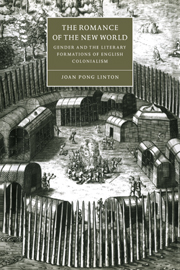Book contents
- Frontmatter
- Contents
- Acknowledgments
- Introduction
- 1 Love's laborers: the busy heroes of romance and empire
- 2 Sea-knights and royal virgins: American gold and its discontents in Lodge's A Margarite of America (1596)
- 3 Jack of Newbery and Drake in California: domestic and colonial narratives of English cloth and manhood
- 4 Eros and science: the discourses of magical consumerism
- 5 Gender, savagery, tobacco: marketplaces for consumption
- 6 Inconstancy: coming to Indians through Troilus and Cressida
- 7 The Tempest, “rape,” the art and smart of Virginian husbandry
- Coda: the masks of Pocahontas
- Notes
- Works cited
- Index
- Cambridge Studies in Renaissance Literature and Culture
5 - Gender, savagery, tobacco: marketplaces for consumption
Published online by Cambridge University Press: 06 November 2009
- Frontmatter
- Contents
- Acknowledgments
- Introduction
- 1 Love's laborers: the busy heroes of romance and empire
- 2 Sea-knights and royal virgins: American gold and its discontents in Lodge's A Margarite of America (1596)
- 3 Jack of Newbery and Drake in California: domestic and colonial narratives of English cloth and manhood
- 4 Eros and science: the discourses of magical consumerism
- 5 Gender, savagery, tobacco: marketplaces for consumption
- 6 Inconstancy: coming to Indians through Troilus and Cressida
- 7 The Tempest, “rape,” the art and smart of Virginian husbandry
- Coda: the masks of Pocahontas
- Notes
- Works cited
- Index
- Cambridge Studies in Renaissance Literature and Culture
Summary
In Book V of the Cosmographia, Sebastian Münster briefly recounts the first voyage of Columbus to the West Indies. The crew had landed at the island of Hispaniola, their presence causing the islanders to flee into the woods. The Spaniards pursued them and, capturing a woman, brought her back to their ship. They filled her with “delicate meates and wyne,” clothed her in “fayre apparel,” and then let her go. “And as this womanne returned to her companie,” we are told, “some being moued by the lyberalitie declared vnto her, came by greate multitudes to the sea bankes, bringinge golde with them, which they chaunged for earthen pottes, and drinking glasses.” The islanders somehow made known that they fled because they mistook the Europeans for cannibals who lived to the south, and even “made greuous complaynt to our men, of the beastly and fearse maners of these Canibales”:
when soeuer they take any of them vnder the age of xiiij yeares, they vse to geld them, and franke them vntyll they be very fat, as we are wont to do with capons or hennes: and as for suche as drawe towarde xx. yeare old, to kyll them forthwith and pull out theyr guttes, and eate the same freshe and newe, wyth other extreme parts of the bodye, poudering the residue with salte, and keping it in a certayne pickle as we do iegottes or sansages [sic]. Yet eate they not the women, but reserue them to encrease, as we do hennes to lay egges. And if thei take any old women, they kepe them for drudges.
- Type
- Chapter
- Information
- The Romance of the New WorldGender and the Literary Formations of English Colonialism, pp. 104 - 130Publisher: Cambridge University PressPrint publication year: 1998

